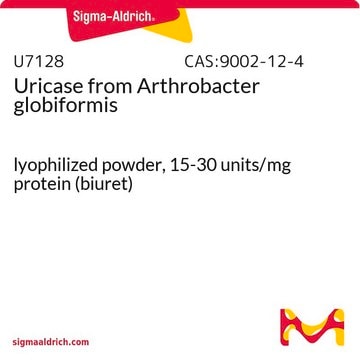Recommended Products
matrix
4% cross-linked agarose
Quality Level
capacity
≥1.5 mg/mL binding capacity (uricase)
storage temp.
2-8°C
Application
Xanthine-agarose is used for protein chromatography, affinity chromatography and specialty resins. Xanthine-agarose has been used to purify and determine molecular properties of urate oxidase from Chlamydomonas reinhardtii. Xanthine-agarose has also been used to determine physicochemical properties and states of sulfhydryl groups of uricase from Candida utilis.
Signal Word
Warning
Hazard Statements
Precautionary Statements
Hazard Classifications
Flam. Liq. 3
Storage Class Code
3 - Flammable liquids
WGK
WGK 2
Flash Point(F)
102.9 °F - closed cup
Flash Point(C)
39.4 °C - closed cup
Certificates of Analysis (COA)
Search for Certificates of Analysis (COA) by entering the products Lot/Batch Number. Lot and Batch Numbers can be found on a product’s label following the words ‘Lot’ or ‘Batch’.
Already Own This Product?
Find documentation for the products that you have recently purchased in the Document Library.
Customers Also Viewed
Débora da Silva Freitas et al.
International journal of pharmaceutics, 387(1-2), 215-222 (2009-12-09)
PEGylation is a successful strategy for improving the biochemical and biopharmaceutical properties of proteins and peptides through the covalent attachment of polyethylene glycol chains. In this work, purified recombinant uricase from Candida sp. (UC-r) was modified by PEGylation with metoxypolyethilenoglycol-p-nitrophenyl-carbonate
J M Alamillo et al.
Biochimica et biophysica acta, 1076(2), 203-208 (1991-01-29)
Urate oxidase (urate: oxygen oxidoreductase, EC 1.7.3.3) from the unicellular green alga Chlamydomonas reinhardtii has been purified to electrophoretic and immunological homogeneity by a procedure which includes as main steps ammonium sulfate fractionation, gel filtration, ion exchange and xanthine-agarose affinity
S S Mösli Waldhauser et al.
Phytochemistry, 45(7), 1407-1414 (1997-08-01)
Caffeine biosynthesis comprises sequential methylations at N-7, N-3 and N-1 of the xanthine ring catalysed by S-adenosyl-L-methionine (SAM)-dependent methyltransferase activities that, to date, have not been resolved. Enzyme extracts were prepared from young, emerging coffee leaflets and following anion exchange
H Nishimura et al.
Journal of biochemistry, 91(1), 41-48 (1982-01-01)
Highly purified uricase [urate: oxygen oxidoreductase, EC 1.7.3.3] was obtained from Candida utilis by affinity chromatography with xanthine-agarose conjugate followed by chromatography with Sephadex G-200 in the presence of dithiothreitol. The uricase molecule had a molecular weight of 120,000 and
Michelle A O'Malley et al.
Journal of structural biology, 159(2), 166-178 (2007-06-27)
The G-protein coupled receptors (GPCRs) are a class of membrane proteins that trigger cellular responses to external stimuli, and are believed to be targets for nearly half of all pharmaceutical drugs on the market. However, little is known regarding their
Our team of scientists has experience in all areas of research including Life Science, Material Science, Chemical Synthesis, Chromatography, Analytical and many others.
Contact Technical Service








